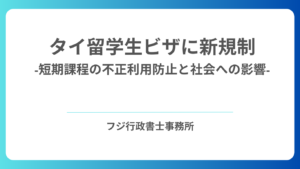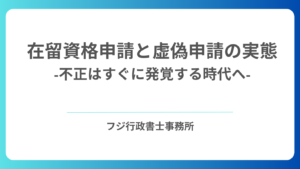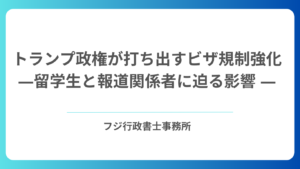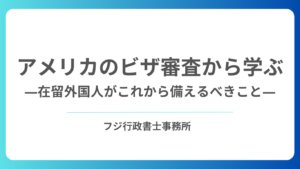「文系だけど、IT業界で働きたい」——そう考える留学生は年々増えています。情報系学部を卒業していなくても、独学や職業訓練校を通じてスキルを身につけ、IT企業に就職する人も珍しくありません。しかし、就職はできても「技術・人文知識・国際業務(技人国)」ビザの審査では、別のハードルが立ちはだかります。
“I majored in humanities, but I want to work in IT.” More and more international students feel this way. Even without a degree in computer science, many acquire IT skills through self-study or training schools and successfully land IT jobs. However, when applying for the “Engineer / Specialist in Humanities / International Services” visa, a different set of challenges can arise.
ビザ審査は「学歴と職務の関連性」を見ている
技人国ビザでは、「その仕事が学歴とどうつながっているか」が重視されます。情報系学部卒の人がプログラマーになる場合は自然ですが、文学部や経済学部など文系出身者がIT職に就く場合、「なぜこの業務に従事できるのか」を説明しないと、不許可になることがあります。
The Gijinkoku visa places strong emphasis on the relationship between your educational background and job duties. For a computer science graduate working as a programmer, the path is straightforward. But if you’re a liberal arts or economics major applying for an IT position, you must clearly explain why you’re qualified for that role—or risk being denied.
実務経験があっても、説明不足で不許可になる
実際には、研修やインターンを通じて十分なスキルを持っていても、「職務内容が曖昧」「学歴との整合性が書類で説明されていない」といった理由で不許可になるケースがあります。特に、企業側がビザ制度を理解していない場合、必要な説明文書が用意されず、結果として申請が通らないことがあります。
In many cases, applicants have sufficient skills through training or internships, but the application is denied due to vague job descriptions or lack of documentation linking their studies to their work. If the employer doesn’t understand the visa process, they may not provide the necessary supporting documents—resulting in rejection.
企業側の理解不足が障壁になることも
「うちで採用したから大丈夫」「日本人と同じ業務だから問題ない」——そう考える企業も多いですが、入管は書類上での説明を求めます。たとえ現場で活躍できるスキルがあっても、それが制度に合致していることを証明しなければなりません。企業側の理解と協力が欠かせません。
Many companies believe that “We hired them, so it should be fine,” or “They’re doing the same work as Japanese employees.” But immigration authorities require clear documentation. Even if you’re capable on the job, you still need to prove that your work meets the visa criteria. Employer understanding and cooperation are essential.
必要なのは「証明できる形」で準備すること
ビザを取得するには、「なぜこの業務が専門的で、なぜこの人ができるのか」を、第三者にもわかる形で示す必要があります。修了証・研修内容・業務記述書などを使い、「誰が見ても理解できる」資料を準備することが重要です。
To obtain the visa, you must explain in a way that a third party can understand: “Why is this job specialized, and why is this person qualified to do it?” Prepare materials such as training certificates, course content, and detailed job descriptions that clearly convey your eligibility.
本当に求められているのは、「翻訳力」
文系だからダメ、ということではありません。重要なのは、「自分の経歴がどう業務と関係しているか」を翻訳し、伝える力です。制度は一見冷たく見えても、丁寧な説明と準備があれば、文系出身でも十分に認められる可能性はあります。
Being a humanities graduate doesn’t disqualify you. What truly matters is your ability to explain how your background relates to your work. The system may seem strict, but with thorough explanation and preparation, you still have a strong chance of being approved.
まとめ:経歴を“制度の言葉”で伝える力を
ITスキルがあることは前提として、その「証明」と「説明」が不十分ではビザの壁を越えるのは難しいのが現実です。制度が求めるのは「実力」だけでなく、それを“伝える力”。自分の強みを、制度の文脈で翻訳する力が、文系出身者の突破口になります。
Having IT skills is only the beginning. Without proper documentation and explanation, it can be hard to get past the visa gate. The system demands not just ability—but the ability to explain it. Translating your strengths into the language of immigration rules is the key to success for humanities graduates entering the IT field.
「こんなことで相談していいの?」
—— 大丈夫です! あなたの不安に丁寧に向き合います
フジ行政書士事務所では、日本で暮らす外国人の方が安心して生活できるよう、ビザのことはもちろん、手続き・仕事・暮らしの中で感じる不安や悩みにも寄り添っています。
「誰に相談したらいいか分からない」そんなときこそ、フジ行政書士事務所にご相談ください。
あなたにとっていちばん良い形を、一緒に考えていきます。
※LINEをご利用でない方は、▶ お問い合わせフォームはこちら からもご相談いただけます。










コメント